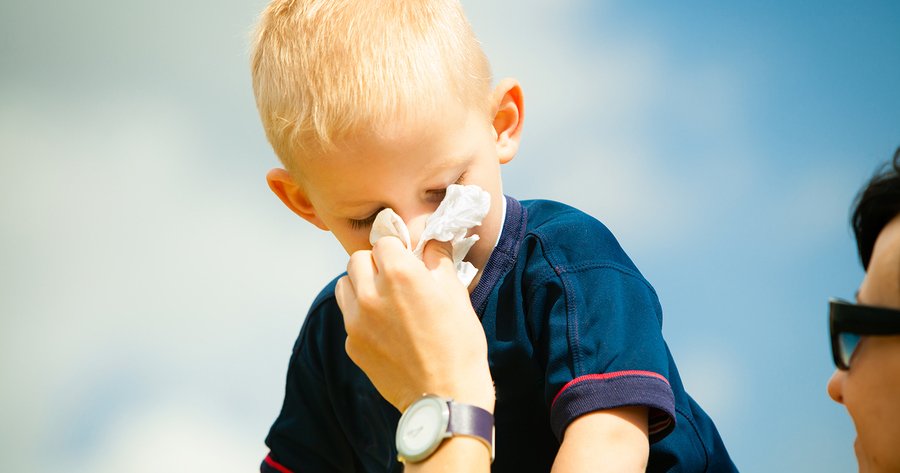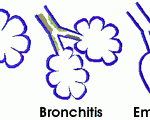If your child is diagnosed with seasonal allergies such as hay fever, you learn to make accommodations. Using an air filter at home, washing hands more frequently, and staying indoors during peak pollen hours can all help reduce symptoms. If your child is diagnosed with asthma, the situation may be a little more serious as this condition can produce severe attacks that require medical attention. But still, plenty of kids have asthma and yet maintain active lifestyles including playing sports. In other words, it’s manageable. Unfortunately, there is now evidence that children with either allergies or asthma may face bigger, less manageable problems over time. According to new research, they appear to be at an increased risk of conditions associated with heart disease as a result of their allergies.
The study, which was conducted at Northwestern University’s Feinberg School of Medicine in Chicago, Illinois, found that children with allergies or asthma may have up to twice the risk (going from 1% to 2%) of developing elevated blood pressure levels and high cholesterol–regardless of whether they are normal weight or overweight.1 Silverberg, Jonathan I. “Atopic disease and cardiovascular risk factors in US children.” The Journal of Allergy and Clinical Immunology. 8 December 2015. Accessed 16 December 2015. http://www.jacionline.org/article/S0091-6749(15)01350-0/fulltext The subjects were more than 13,000 children through the age of 17 who were living in homes across the United States with a parent who answered a questionnaire about lifestyle and health issues.
Among the children living in these households, approximately 14 percent had asthma, 16 percent had hay fever, and 12 percent had eczema. When the researchers analyzed this data against other health problems, they determined that the kids who had been diagnosed with asthma or hay fever had double the chance of developing hypertension and high cholesterol compared to their peers without these ailments. Those with asthma or hay fever also were notably more likely to be overweight or obese.
You might say, well sure, if this group of kids is very heavy, then that could be the cause of the boost in blood pressure and cholesterol levels. Weight may certainly be a contributing factor, but, citing this concern, the scientists then re-evaluated the results to control for obesity and found that the elevated risk was still present. Interestingly, though, the kids with asthma or hay fever were not shown to be more likely to develop diabetes.
The children with eczema, a skin condition common in people with allergies that typically manifests as itchy, scaly rashes, were not shown to have any greater likelihood of having hypertension and high cholesterol than the participants without any allergy-related conditions. They were, however, more often overweight than their non-allergic peers.
As mentioned earlier, the increased risk for those kids with asthma or hay fever to develop hypertension and high cholesterol levels was found to be fairly small, about one percentage point higher than their healthy counterparts because the overall risk among children 17 and under is so low. But the study was not designed to determine whether the risk went up along with the severity of the condition, so it is entirely possible that some of the kids have a substantially greater risk than one percent.
Allergies and asthma were not shown to cause heart-related problems, but the same issues may contribute to all of these conditions. The number one culprit may well be inflammation, which is associated with allergies, asthma, eczema, high blood pressure, elevated cholesterol, and obesity. Another chronic ailment, psoriasis, which results in thick, scaly patches of skin, was discovered in a 2015 study at the National Institutes of Health in Bethesda, Maryland to be linked to a greater risk of developing heart disease.2 Naik, Haley B.; et al. “Severity of Psoriasis Associates With Aortic Vascular Inflammation Detected by FDG PET/CT and Neutrophil Activation in a Prospective Observational Study.” Arteriosclerosis, Thrombosis, and Vascular Biology. 8 October 2015. Accessed 17 December 2015. http://atvb.ahajournals.org/content/35/12/2667.full
So if you’re the parent of a child with asthma, hay fever, or eczema, you will want to do what you can to keep the condition under control and limit inflammation. In addition, help your little one maintain a healthy lifestyle and strengthen his or her immune system to minimize the damage that is done. That means promoting regular exercise and eating a nutritious diet to keep excess pounds off. And you can serve as a good role model in these areas to provide your child with a great foundation for building a healthy life despite having an allergic condition.
References
| ↑1 | Silverberg, Jonathan I. “Atopic disease and cardiovascular risk factors in US children.” The Journal of Allergy and Clinical Immunology. 8 December 2015. Accessed 16 December 2015. http://www.jacionline.org/article/S0091-6749(15)01350-0/fulltext |
|---|---|
| ↑2 | Naik, Haley B.; et al. “Severity of Psoriasis Associates With Aortic Vascular Inflammation Detected by FDG PET/CT and Neutrophil Activation in a Prospective Observational Study.” Arteriosclerosis, Thrombosis, and Vascular Biology. 8 October 2015. Accessed 17 December 2015. http://atvb.ahajournals.org/content/35/12/2667.full |












What next? I think that the
What next? I think that the allergy relation to all the cardiovascular problems is ridiculous. There is no way of proving same as there are so many variables. Everyone is allergic to something, but they may not have come across it. And a hypersensitive immune response in children often keeps them from having cancer. And if a child is allergic you do not keep a clean environment or get rid of pets because the body adjusts to the situation and begins to tolerate the allergen. I’m very old and had allergies. My father let me roll around in dirt and hay and cats and dogs. I built an immunity!!!
I have hay fever and the
I have hay fever and the medicine I was prescribed for years was actifed which I believe let to my developing hypertension.